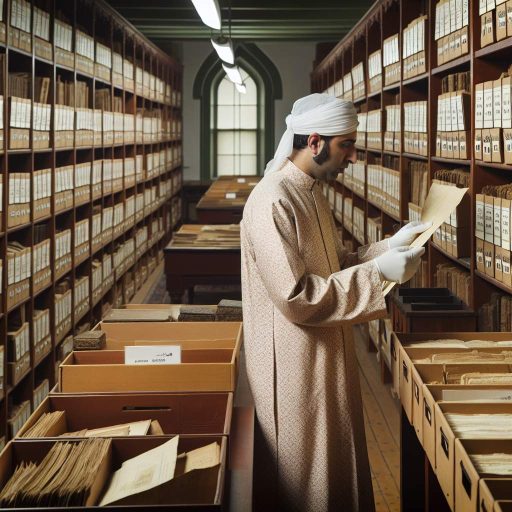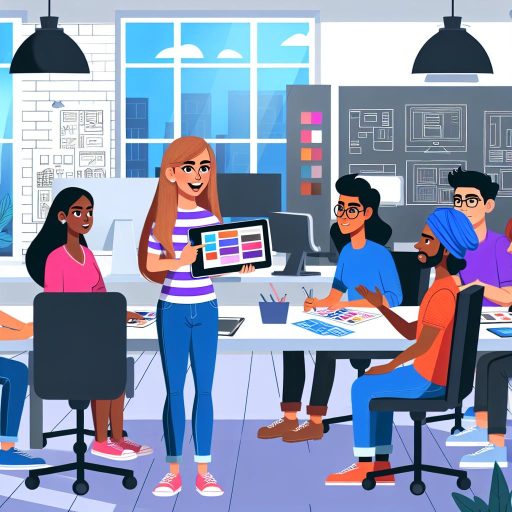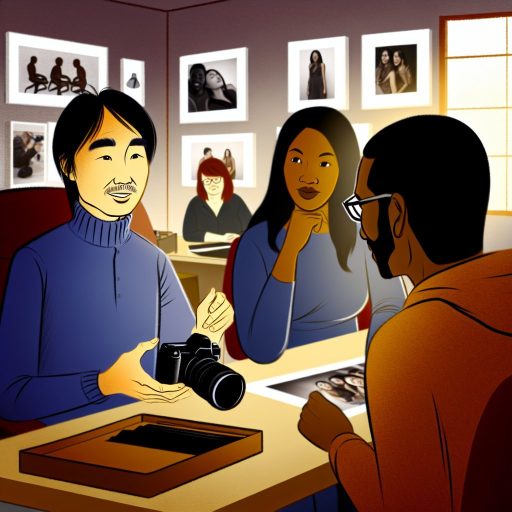Understanding the Role of an Archivist
Responsibilities of an Archivist
An archivist plays a crucial role in preserving historical documents.
They organize records to ensure easy access for researchers and the public.
Additionally, they evaluate materials for retention versus disposal.
Maintaining digital archives is increasingly important in today’s world.
Archivists also develop policies for the care and management of records.
Furthermore, they conduct outreach to promote archival collections.
Essential Skills for Archivists
Attention to detail is vital for archivists in their work.
Strong organizational skills help them manage large volumes of materials.
Communication abilities enhance their work with the public and colleagues.
Research proficiency aids in evaluating and categorizing records.
Technology skills are crucial for managing digital archives.
Finally, archivists should possess problem-solving capabilities for various challenges.
Educational Background
A bachelor’s degree is typically the minimum requirement for an archivist.
Many archivists hold advanced degrees in history or archival studies.
Relevant coursework includes topics in preservation and information management.
Internships provide practical experience in archival work.
Work Environments
Archivists can work in various settings, including museums and libraries.
Government agencies also employ archivists to manage public records.
Additionally, corporations require archivists for record management purposes.
Nonprofit organizations often maintain collections that need archivists’ expertise.
Educational Pathways
Degrees for Archivists
A bachelor’s degree is essential for aspiring archivists.
This degree often focuses on history, library science, or information management.
Additionally, many universities offer specialized master’s programs in archives.
These programs provide advanced training in archival theory and practice.
Consider institutions like the University of Texas or Syracuse University.
Unlock Your Career Potential
Visualize a clear path to success with our tailored Career Consulting service. Personalized insights in just 1-3 days.
Get StartedCertifications and Professional Development
Certification can enhance job prospects significantly.
The Academy of Certified Archivists offers widely recognized credentials.
Gaining certification indicates a professional level of competence.
Moreover, continuing education is crucial in this evolving field.
Workshops and online courses keep skills sharp and knowledge current.
Internships and Practical Experience
Internships provide valuable hands-on experience in archival settings.
Many graduate programs require or recommend internships to students.
Seek opportunities at local historical societies or museums.
Practical experience deepens understanding of archival work.
This also helps build a professional network within the field.
Building a Professional Network
Networking is key to finding job opportunities in the archival field.
Attend industry conferences and workshops to meet professionals.
Join organizations like the Society of American Archivists for networking.
Participate actively in discussions and forums related to archives.
Connecting with peers can provide mentorship and job leads.
Staying Updated with Trends
The archival profession continually evolves alongside technology.
Stay informed by reading relevant journals and following blogs.
Join social media groups focused on archival discussions.
This helps archivists adapt to new tools and methodologies.
Embracing change ensures ongoing relevance in the profession.
Gaining Relevant Experience
Internships
Internships offer valuable hands-on opportunities for aspiring archivists.
Many academic institutions provide internship programs in local archives.
Seek internships at museums, historical societies, or university libraries.
These experiences help build essential skills in archival practices.
Work closely with professionals to understand daily archival operations.
Many internships include projects that contribute to your resume.
Moreover, internships often lead to professional networking opportunities.
Volunteer Opportunities
Volunteering is another effective way to gain experience in the field.
Many organizations welcome volunteers to assist with archiving tasks.
Consider reaching out to local libraries or nonprofit organizations.
Volunteering can enhance your practical skills significantly.
Additionally, it demonstrates your commitment to the archival profession.
Many volunteers also develop lasting relationships in the archival community.
Developing Skills
Focus on developing technical skills relevant to archiving.
Familiarize yourself with digital archiving tools and software.
Understanding preservation techniques is crucial for an archivist.
Moreover, consider taking courses related to archival science.
Look for workshops or online courses that align with your interests.
This self-directed learning complements practical experience.
Building a Professional Network
Networking is essential for personal and professional growth.
Attend industry conferences and seminars to meet fellow archivists.
Engage with local or online communities focused on archives and preservation.
Participate in informational interviews to gain insights from other professionals.
These interactions can lead to mentorship opportunities as well.
By building relationships, you may discover job openings before they are advertised.
You Might Also Like: Building a Strong Portfolio for a Fashion Design Career
Building a Professional Network
Joining Archivist Associations
Becoming a member of archivist associations is essential for networking.
These organizations offer valuable resources and support.
Consider joining the Society of American Archivists or similar groups.
Membership often provides access to exclusive events and workshops.
Additionally, associations frequently publish industry news and best practices.
Participating in Online Communities
Engaging in online communities benefits your career development.
Websites like LinkedIn host groups dedicated to archivists.
Participation in these groups allows for knowledge exchange.
Moreover, online platforms provide opportunities to seek mentorship.
Attending Conferences and Workshops
Attending industry conferences enhances your professional network.
Look for events held by archivist associations and universities.
These gatherings often feature professionals from various sectors.
Engagement in workshops further develops your practical skills.
Such experiences can lead to potential job opportunities.
Networking with Professionals
Building relationships with established archivists is crucial.
Reach out for informational interviews to gain insights.
Networking can occur both in-person and digitally.
Use platforms such as Twitter to connect with industry leaders.
Participating in local meetups helps foster meaningful connections.
You Might Also Like: How to Price Your Fashion Designs for Profit and Value
Developing Technical Skills
Software Used in Archiving
Archivists rely on various software to manage collections effectively.
Digital asset management software helps organize and preserve digital files.
Examples include Archivematica and Omeka.
These programs streamline workflows and improve access to materials.
Tools for Digitizing Collections
Archivists often use tools for digitizing physical items.
Flatbed scanners are essential for converting documents and photographs.
High-resolution cameras capture three-dimensional objects.
Additionally, audio and video equipment preserves multimedia materials.
Metadata Standards
Understanding metadata standards is crucial for archivists.
Metadata helps enhance discoverability and usability of collections.
Standards like Dublin Core and MODS are widely adopted.
These frameworks ensure consistency and interoperability across systems.
Learning Management Systems
Archivists may utilize learning management systems for training.
These platforms facilitate professional development opportunities.
Examples include Moodle and Blackboard.
They offer courses on archival practices and digital preservation.
Networking with Professionals
Networking is vital for archivists to share knowledge and skills.
Professional organizations like ACA and SAA provide resources.
Attending conferences helps archivists stay abreast of industry trends.
Connecting with peers also opens doors to job opportunities.
Online Communities and Resources
Online communities can enhance learning and collaboration.
Platforms like Reddit and LinkedIn host active archivist groups.
Webinars and online tutorials offer valuable insights and tips.
Engaging with these resources supports continuous skill development.
Uncover the Details: How to Monetize Your Skills as a Canadian Content Creator

Crafting a Standout Resume and Cover Letter for Archivist Positions
Understanding the Role of an Archivist
An archivist plays a crucial role in preserving historical records.
They ensure that valuable information is accessible for future generations.
Moreover, they manage collections and maintain accurate documentation.
Essential Components of a Resume
Start with a professional summary that highlights relevant skills.
Include a section for your education to showcase your qualifications.
List your work experience in reverse chronological order.
This format emphasizes your most recent and relevant roles.
Don’t forget to include skills specific to archival science.
Consider soft skills like organization and communication as well.
Highlighting Relevant Experience
Detail your internships or volunteer work in the archival field.
For example, if you worked at a local historical society, mention it.
Outline specific tasks you performed, such as digitization projects.
Use action words to describe your contributions effectively.
Formatting Your Resume
Keep your resume to one page if possible.
Use clear headers and bullet points for easy readability.
This structure allows hiring managers to quickly assess your qualifications.
Crafting an Engaging Cover Letter
Your cover letter introduces you beyond the resume.
Start with a strong opening that captivates the reader’s interest.
Briefly explain why you are passionate about archiving.
Personalizing Your Cover Letter
Address the letter directly to the hiring manager, if possible.
Research the organization to mention specific projects or values.
This shows that you are genuinely interested in the position.
Demonstrating Your Value
Highlight experiences that align with the job description.
Discuss how you can contribute to the organization’s goals.
Conclude with a call to action, expressing your desire for an interview.
See Related Content: The Role of Technology in Modern Fashion Design
Preparing for Job Interviews: Common Questions and Best Practices
Understanding the Role of an Archivist
An archivist’s role is vital in preserving historical records.
This profession requires effective organizational skills.
Additionally, knowledge of archival science is essential.
Common Interview Questions
Expect to answer questions about your experience in archival management.
Interviewers often ask about your familiarity with specific archives.
They may inquire about your strategies for document preservation.
Be prepared to discuss your experience with cataloging systems.
Also, they might ask how you handle sensitive materials.
Best Practices for Responding
Firstly, provide detailed examples from your past roles.
Use the STAR method to structure your responses effectively.
Additionally, showcase your passion for preserving history.
Demonstrate your problem-solving skills during the interview.
Lastly, express your eagerness to learn and grow in the field.
Researching the Organization
Research the organization before your interview.
Understand their mission and core values.
Familiarize yourself with their collection’s focus areas.
This knowledge helps you tailor your responses specifically.
Questions to Ask the Interviewer
Prepare thoughtful questions to ask at the end of the interview.
Inquire about opportunities for professional development.
Ask about the organization’s long-term archival goals.
Additionally, seek information about team dynamics.
Practical Preparations
Dress professionally to make a positive first impression.
Practice your responses to common questions with a friend.
Bring copies of your resume and a list of references.
Lastly, ensure you arrive on time for the interview.
Continuing Education: Lifelong Learning and Professional Development in Archiving
The Importance of Lifelong Learning
Lifelong learning is essential in the field of archiving.
It keeps professionals updated on best practices and evolving technologies.
Continuous education helps archivists adapt to changing information landscapes.
Formal Education Options
Many universities offer degree programs in archival studies.
Programs often include hands-on training and theoretical knowledge.
Consider pursuing a Master’s degree for advanced opportunities.
Online Courses and Certifications
Online courses provide flexible learning options for busy professionals.
Organizations like the Society of American Archivists offer certifications.
These certifications enhance credentials and demonstrate specialized skills.
Workshops and Conferences
Attending workshops fosters networking and collaborative learning.
Conferences expose archivists to new trends and technologies.
They often feature keynote speakers sharing industry insights.
Professional Organizations
Joining professional organizations enriches learning opportunities.
Organizations frequently provide resources and access to webinars.
Engagement with peers is invaluable for career development.
Self-Directed Learning
Self-directed learning enriches an archivist’s knowledge base.
Reading industry publications keeps one informed about hot topics.
Participating in online forums fosters discussion and knowledge sharing.
Research and Writing
Conducting research hones analytical and critical thinking skills.
Writing articles contributes to the professional community’s knowledge base.
Publishing research can enhance visibility within the field.
Mentorship and Networking
Finding a mentor can significantly impact career growth.
Mentors can offer guidance and share valuable experiences.
Networking with professionals opens new opportunities for collaboration.
Volunteer Work
Engaging in volunteer work enhances practical skills.
It also builds a professional network within the community.
Nonprofit organizations often seek volunteers for archival projects.
Staying Current with Technology
Technology evolves rapidly, impacting archival practices.
Staying informed about new software and tools is vital.
Workshops on digital archiving are particularly beneficial.
Embracing Change
Change is a constant in the field of archiving.
Embracing new methodologies can enhance archiving processes.
Flexibility ensures professionals remain relevant and effective.
Additional Resources
Linda Canada – Archivist – Japanese American Historical Society of …
Music Stars Making A Social Impact: Why & How Candice Hoyes Is …




